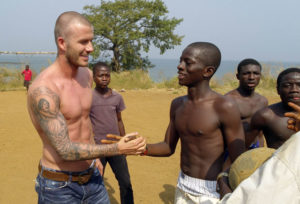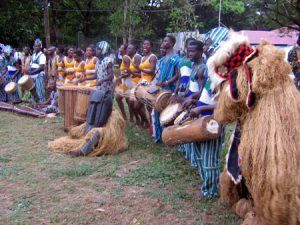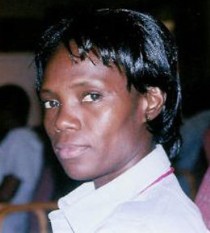(1)
Breaking The Silence: First Government Study Of MSM In Sierra Leone
The National HIV/Aids Secretariat of Sierra Leone, which falls under the National HIV/Aids Control Program (NACP) recently conducted a ground-breaking study on Men who have Sex with Men (MSM) around the country. (photo: Dave Beckham and locals)

The 2011 study on MSM in Sierra Leone has broken the silence on the existence of sexual minorities in Sierra Leone. Findings from this survey revealed several problems affecting sexual minorities, especially MSM in Sierra Leone. The issue of labeling amongst MSM in Sierra Leone came up very strongly during the study.
The report concluded that while society may be very quick to conclude the sexual orientation of men who have sex with men, some MSM respondents did not connect their sexual practices with being “gay.” Some respondents insisted on the “heterosexual” identity and preferred it to remain like that.
What this mean for programmers is that there is need to be cautious in labeling in any intervention that targets MSM, for maximum impact. The study also found that mltiple partnering is very common amongst MSM in Sierra Leone. Not only did respondents profess multiple male partnering, the study also reveal a bisexual concurrency.
 The study also found that transactional sex exists amongst MSM, with both male and female clients. According to the findings, “the legal and policy environment, which criminalises sexual minorities and their behavior, acts as an incitement to society to discriminate against sexual minorities. Unfortunately, this has an adverse effect on sustainability of HIV response and public health in general. (photo: music ceremony)
The study also found that transactional sex exists amongst MSM, with both male and female clients. According to the findings, “the legal and policy environment, which criminalises sexual minorities and their behavior, acts as an incitement to society to discriminate against sexual minorities. Unfortunately, this has an adverse effect on sustainability of HIV response and public health in general. (photo: music ceremony)
“The findings also show that there is a high level of ignorance because sexuality and sexual rights issues are not openly discussed. The implication of this ignorance is that intolerant behaviors have developed against sexual minorities and same-sex sexual practices, including those that do not infringe on the rights of others in Sierra Leone.
The legal, policy and knowledge climate must be made conducive to create the requisite environment for sexual minorities to be free from discriminatory practices and human rights violations.”
This qualitative study was to compliment quantitative data that revealed HIV prevalence amongst MSM to be 7.5% during the National Mode of Transmission study that was conducted in July 2010. Read complete story.
From Behind The Mask
by Akoro Joseph Sewedo, Arcus Correspondent
July 15, 2011
(2)
The Life and Death of Fannyann Eddy (1974–2004)
The most notorious event in the history of gay Sierra Leone was the murder of a outstanding and outspoken lesbian activist Fannyann Eddy in 2004.
Sierra Leone activist Fannyann Eddy killed; African lesbian activist is raped and murdered
November 01, 2004
“Yet, despite all of the difficulties we face, I have faith that acknowledging the inherent dignity and respect due us can lead to greater respect for our human rights.… Silence creates vulnerability. I urge you, members of the Commission on Human Rights, to break the silence. You can help us achieve our full rights and freedoms, in every society, including my beloved Sierra Leone.” (photo: FannyAnn Eddy)
-Delivered to the United Nations Commission on Human Rights by Fannyann Eddy, Sierra Leone Lesbian and Gay Association, April 2004.
Statement by International Gay and Lesbian Human Rights Commission
Fannyann Eddy broke the silence for us all. She courageously brought the struggle for freedom and dignity in her own country to the world stage. In early October, that voice was silenced forever. As Fannyann worked late in her office in Freetown, several men broke in, raped and brutally murdered her. To all of us who knew her and shared the great privilege of her wit, sense of the absurd, steely determination, intelligence, and unwillingness to let bureaucracy and lies stand in the way of justice, our loss is incomprehensibly great. Fannyann was the fearless leader of the Sierra Leone Lesbian and Gay Association.
She understood that freedom for women, in particular lesbians, was related to their ability to provide for themselves economically. As a result, her approach to human rights advocacy included putting her own money into buying materials for young lesbians to make clothing and other items that they could sell for income. She understood that human rights is not only a legal principle to be enforced but a measure of human dignity to be demanded. As a result, she dedicated much of her time to getting into schools to teach children about their own self worth.
And she understood that standing up for our rights is a process of both large and small acts. When she encountered difficulty getting a visa to travel to Geneva to tell her story to the United Nations Human Rights Commission, Fannyann sat vigil until it was approved. The staff and board of IGLHRC (International Gay and Lesbian Human Rights Commission) deeply mourn her loss. She was a member of the historic delegation that IGLHRC and Human Rights Watch brought to the United Nations Human Rights Commission in Geneva last spring to advocate for the Resolution on Sexual Orientation and Human Rights. (See full report)
(3)
The US State Department Human Rights Report on Sierra Leone has the following comments about LGBT life:
The constitution does not offer protection from discrimination based on sexual orientation. A law from 1861 still in force prohibits male homosexual acts; however, there is no legal prohibition against female-to-female sex. The 1861 law carries a penalty of life imprisonment for indecent assault upon a man or 10 years for such an attempted assault. However, the law was not enforced in practice due to the secrecy surrounding homosexual conduct and the tendency for communities to discriminate against individuals rather than to enforce legal codes.
There were a few organizations working to support gay, bisexual, lesbian, and transgender persons. Because such individuals were not culturally accepted, particularly among men, the groups had to remain underground and hidden for fear of discrimination or violence against their members. Gay pride parades and other public displays of solidarity could not safely take place.
There were unofficial reports of beatings by police and others, particularly targeting men dressed as women, but formal complaints were not filed due to fear of reprisal. Lesbian girls and women were also victims of “planned rapes” that were initiated by family members in an effort to change their sexual orientation.
Social discrimination based on sexual orientation occurs in nearly every facet of life for known gays and lesbians, and many choose to have heterosexual relationships and family units to shield them. In the areas of employment and education, sexual orientation is the basis for abusive treatment, which has led individuals to leave their jobs or courses of study.
It is difficult for gays and lesbians to receive the health services they need, due to fear that their confidentiality rights would be ignored if they were honest about their ailments; many choose not to be tested or treated for sexually transmitted infections. Secure housing is also a problem for gays, lesbians, bisexuals, and transgender persons. Gay children frequently are shunned by their families, leading some to turn to prostitution to survive. Adults can lose their leases if their sexual orientation becomes public.
















